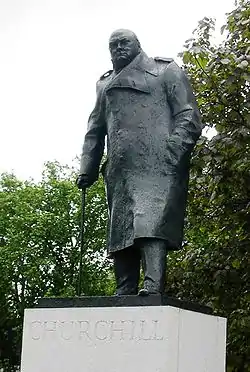Winston Churchill as historian
The British statesman Winston Churchill was a prolific writer throughout his life, and many of his works were historical. His better-known historical works include: Marlborough: His Life and Times, The World Crisis (a history of World War I), The Second World War, and A History of the English-Speaking Peoples. Churchill was awarded the Nobel Prize in Literature in 1953 for "his mastery of historical and biographical description".

Churchill's view of history
Churchill was an exponent of the view that the British and American people had a unique greatness and destiny and that all British history should be seen as progress towards fulfilling that destiny. This belief inspired his political career as well as his historical writing.
Although Churchill was not a trained historian, the influences on his historical thought and prose style, were likely Clarendon's history of the English Civil War, Gibbon's Decline and Fall and Macaulay's History of England.
Churchill's historical works fall into three categories: family history, autobiography and narrative history.
Family history
The first category comprises his works of family history: the biography of his father, Lord Randolph Churchill in two volumes (1906), and of that of his great ancestor, Marlborough: His Life and Times in four volumes (1933–38).
Autobiography
The second category is Churchill's autobiographical works, including his early journalistic compilations The Story of the Malakand Field Force (1898), The River War (1899), London to Ladysmith via Pretoria (1900) and Ian Hamilton's March (1900). These latter two were issued in a re-edited form as My Early Life (1930). All of these books contain information about Britain's imperial wars in India, Sudan and South Africa. The works on South Africa contain elements of self-promotion, since Churchill was a candidate for Parliament in 1900.
These four books were republished as Frontiers and Wars: His Four Early Books Covering His Life As Soldier and War Correspondent, New York: Harcourt, Brace & World, Inc., 1962.
Narrative history
Churchill's reputation as a writer, however, rests on his multi-volume works of narrative history: The World Crisis (six volumes, 1923–31), and of The Second World War (six volumes, 1948–53), and his A History of the English-Speaking Peoples (four volumes, 1956–58, much of which had been written as journalism in the 1930s). These are among the longest works of history ever published: The Second World War runs to more than two million words.
Churchill's histories of the two world wars were based on the author's status as a central participant in both stories. Although both are memoirs as well as histories, Churchill was careful to broaden their scope to include events in which he played no part—the war between Nazi Germany and the Soviet Union, for example. Inevitably, however, Churchill placed Britain, and therefore himself, at the centre of his narrative. Arthur Balfour described The World Crisis as "Winston's brilliant autobiography, disguised as a history of the universe." In any case he had far fewer documentary sources for matters not involving Britain.
Access to documents
As a Cabinet minister for part of the First World War and as Prime Minister for nearly all of the Second, Churchill had unique access to official documents, military plans, official secrets and correspondence between world leaders. After the First War, when there were few rules governing these documents, Churchill simply took many of them with him when he left office, and used them freely in his books, particularly for The World Crisis. This was done by other wartime ministers such as David Lloyd George, but, following the First World War, stricter rules were put in place regarding Cabinet documents.
The World Crisis began as a response to Lord Esher's attack on his reputation in his memoirs, but it soon broadened out into a general multi-volume history. The volumes are a mix of military history, written with Churchill's usual narrative flair, diplomatic and political history, portraits of other political and military figures, and personal memoir, written in a colourful manner.
When he resumed office in 1939, Churchill fully intended to write a history of the war then beginning. He said several times: "I will leave judgements on this matter to history—but I will be one of the historians." To circumvent the rules against the use of official documents, he took the precaution throughout the war of having a weekly summary of correspondence, minutes, memoranda and other documents printed in galleys and headed "Prime Minister's personal minutes". As well, Churchill actually wrote or dictated a number of letters and memoranda with the specific intention of placing his views on the record for later use as a historian.
Controversy
This all became a source of great controversy when The Second World War began appearing in 1948. Churchill was not an academic historian, he was a politician, and was in fact Leader of the Opposition, still intending to return to office. By what right, it was asked, did he have access to Cabinet, military and diplomatic records which were denied to other historians?
What was unknown at the time was that Prime Minister Clement Attlee agreed to allow him (or rather his research assistants) free access to all documents, provided that (a) no official secrets were revealed (b) the documents were not used for party political purposes and (c) the typescript was vetted by the Cabinet Secretary, Sir Norman Brook. Brook took a close interest in the books and rewrote some sections himself to ensure that nothing was said which might harm British interests or embarrass the government. Churchill's history thus became a semi-official one.
References
- Reynolds, David (2005). In Command of History: Churchill Fighting and Writing the Second World War (2nd ed.). London: Penguin Books. p. . ISBN 978-0-14-101964-2.